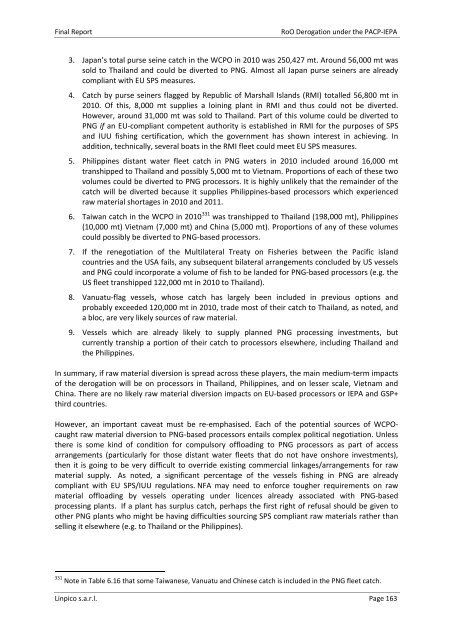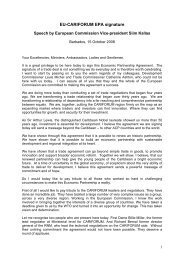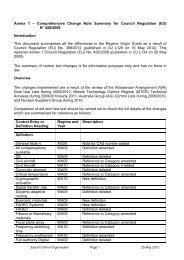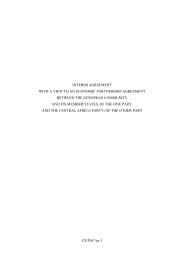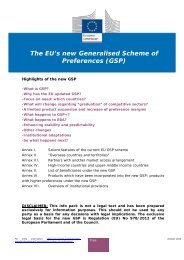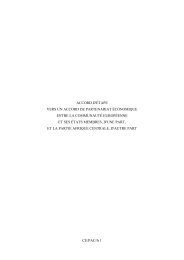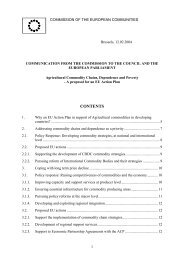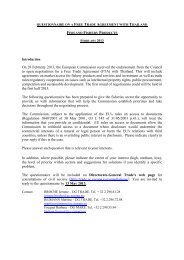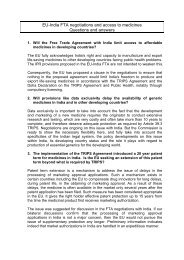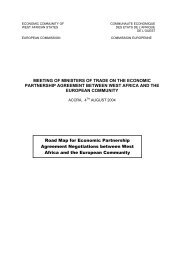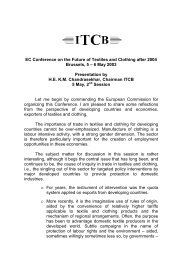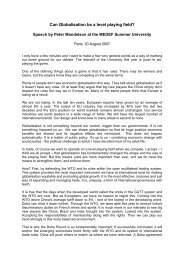Report on the Implementation of the derogation to ... - Trade Websites
Report on the Implementation of the derogation to ... - Trade Websites
Report on the Implementation of the derogation to ... - Trade Websites
You also want an ePaper? Increase the reach of your titles
YUMPU automatically turns print PDFs into web optimized ePapers that Google loves.
Final <str<strong>on</strong>g>Report</str<strong>on</strong>g><br />
RoO Derogati<strong>on</strong> under <strong>the</strong> PACP-IEPA<br />
3. Japan’s <strong>to</strong>tal purse seine catch in <strong>the</strong> WCPO in 2010 was 250,427 mt. Around 56,000 mt was<br />
sold <strong>to</strong> Thailand and could be diverted <strong>to</strong> PNG. Almost all Japan purse seiners are already<br />
compliant with EU SPS measures.<br />
4. Catch by purse seiners flagged by Republic <strong>of</strong> Marshall Islands (RMI) <strong>to</strong>talled 56,800 mt in<br />
2010. Of this, 8,000 mt supplies a loining plant in RMI and thus could not be diverted.<br />
However, around 31,000 mt was sold <strong>to</strong> Thailand. Part <strong>of</strong> this volume could be diverted <strong>to</strong><br />
PNG if an EU-compliant competent authority is established in RMI for <strong>the</strong> purposes <strong>of</strong> SPS<br />
and IUU fishing certificati<strong>on</strong>, which <strong>the</strong> government has shown interest in achieving. In<br />
additi<strong>on</strong>, technically, several boats in <strong>the</strong> RMI fleet could meet EU SPS measures.<br />
5. Philippines distant water fleet catch in PNG waters in 2010 included around 16,000 mt<br />
transhipped <strong>to</strong> Thailand and possibly 5,000 mt <strong>to</strong> Vietnam. Proporti<strong>on</strong>s <strong>of</strong> each <strong>of</strong> <strong>the</strong>se two<br />
volumes could be diverted <strong>to</strong> PNG processors. It is highly unlikely that <strong>the</strong> remainder <strong>of</strong> <strong>the</strong><br />
catch will be diverted because it supplies Philippines-based processors which experienced<br />
raw material shortages in 2010 and 2011.<br />
6. Taiwan catch in <strong>the</strong> WCPO in 2010 331 was transhipped <strong>to</strong> Thailand (198,000 mt), Philippines<br />
(10,000 mt) Vietnam (7,000 mt) and China (5,000 mt). Proporti<strong>on</strong>s <strong>of</strong> any <strong>of</strong> <strong>the</strong>se volumes<br />
could possibly be diverted <strong>to</strong> PNG-based processors.<br />
7. If <strong>the</strong> renegotiati<strong>on</strong> <strong>of</strong> <strong>the</strong> Multilateral Treaty <strong>on</strong> Fisheries between <strong>the</strong> Pacific island<br />
countries and <strong>the</strong> USA fails, any subsequent bilateral arrangements c<strong>on</strong>cluded by US vessels<br />
and PNG could incorporate a volume <strong>of</strong> fish <strong>to</strong> be landed for PNG-based processors (e.g. <strong>the</strong><br />
US fleet transhipped 122,000 mt in 2010 <strong>to</strong> Thailand).<br />
8. Vanuatu-flag vessels, whose catch has largely been included in previous opti<strong>on</strong>s and<br />
probably exceeded 120,000 mt in 2010, trade most <strong>of</strong> <strong>the</strong>ir catch <strong>to</strong> Thailand, as noted, and<br />
a bloc, are very likely sources <strong>of</strong> raw material.<br />
9. Vessels which are already likely <strong>to</strong> supply planned PNG processing investments, but<br />
currently tranship a porti<strong>on</strong> <strong>of</strong> <strong>the</strong>ir catch <strong>to</strong> processors elsewhere, including Thailand and<br />
<strong>the</strong> Philippines.<br />
In summary, if raw material diversi<strong>on</strong> is spread across <strong>the</strong>se players, <strong>the</strong> main medium-term impacts<br />
<strong>of</strong> <strong>the</strong> derogati<strong>on</strong> will be <strong>on</strong> processors in Thailand, Philippines, and <strong>on</strong> lesser scale, Vietnam and<br />
China. There are no likely raw material diversi<strong>on</strong> impacts <strong>on</strong> EU-based processors or IEPA and GSP+<br />
third countries.<br />
However, an important caveat must be re-emphasised. Each <strong>of</strong> <strong>the</strong> potential sources <strong>of</strong> WCPOcaught<br />
raw material diversi<strong>on</strong> <strong>to</strong> PNG-based processors entails complex political negotiati<strong>on</strong>. Unless<br />
<strong>the</strong>re is some kind <strong>of</strong> c<strong>on</strong>diti<strong>on</strong> for compulsory <strong>of</strong>floading <strong>to</strong> PNG processors as part <strong>of</strong> access<br />
arrangements (particularly for those distant water fleets that do not have <strong>on</strong>shore investments),<br />
<strong>the</strong>n it is going <strong>to</strong> be very difficult <strong>to</strong> override existing commercial linkages/arrangements for raw<br />
material supply. As noted, a significant percentage <strong>of</strong> <strong>the</strong> vessels fishing in PNG are already<br />
compliant with EU SPS/IUU regulati<strong>on</strong>s. NFA may need <strong>to</strong> enforce <strong>to</strong>ugher requirements <strong>on</strong> raw<br />
material <strong>of</strong>floading by vessels operating under licences already associated with PNG-based<br />
processing plants. If a plant has surplus catch, perhaps <strong>the</strong> first right <strong>of</strong> refusal should be given <strong>to</strong><br />
o<strong>the</strong>r PNG plants who might be having difficulties sourcing SPS compliant raw materials ra<strong>the</strong>r than<br />
selling it elsewhere (e.g. <strong>to</strong> Thailand or <strong>the</strong> Philippines).<br />
331 Note in Table 6.16 that some Taiwanese, Vanuatu and Chinese catch is included in <strong>the</strong> PNG fleet catch.<br />
Linpico s.a.r.l. Page 163


